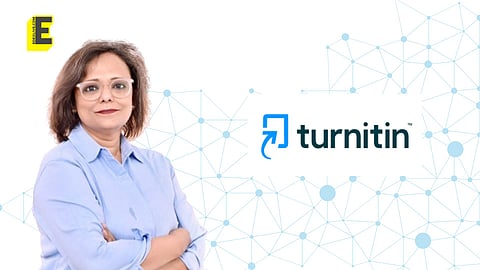"Use AI as an enabler, not substitute for educational resources": Turnitin's South Asia Director
Why is responsible AI use important in educational institutions?
AI can serve as an operational efficiency or productivity tool and has incredible potential to benefit humans and society, but it must be developed thoughtfully.
Discussions and policies around responsible integration and use of AI aim to help people build socially beneficial, safe, and accountable technology.
Organisations should consider focusing on AI literacy training, putting employees in the lead, providing accessibility, and developing AI skills at all levels.
The responsible use of AI in academic institutions is important as students form the foundation of society.
To inculcate creative thinking and critical writing skills, we need to encourage students to not use AI for the entire preparation of their paper but rather use it as an aid to write on their own.
Responsible usage will ensure that even academicians use AI as an enabler and not a substitute for educational resources.
What are the considerations for using AI tools in academic research and writing?
It is very important for educators and students to understand the fundamentals of academic integrity as set out by the International Centre of Academic Integrity — that is honesty, trust, fairness, respect, responsibility, and courage.
Educational institutions need to engage with students while integrating AI tools with emphasis on integrity and as it is “viewed” by them vis-à-vis what it actually is. It is through dialogues that academic integrity can be maintained rather than by penalising students or using tools as a punishment — rather it should be viewed as an attempt to enable students to gather ideas and build on them with their inputs.
How can educational academies address data privacy and security concerns when using AI?
Educators and institutions will continue to provide a safe and secure place to learn, practice, take chances, and grow. Generative AI writing is a tool of inquiry, not definitive thinking, and learning to write well is the bedrock on which every other skill is developed.
Students need a learning environment where they learn the technology's strengths and weaknesses, and how to use it safely and responsibly to be best prepared for a future workforce requiring generative AI writing tools.
It is crucial to ensure that data privacy and security concerns are addressed when using AI.
Why is transparency in AI decision-making important in education, and how can it be achieved?
We stand for the integrity of student learning and scholarly research and provide solutions to help institutions and researchers uphold academic integrity. It is important to proactively practice transparency and share when AI is present in writing. Clarity avoids confusion.
How can AI tools be integrated into the curriculum to enhance learning while preventing misuse?
First and foremost, it’s crucial to begin by explaining what using writing AI might entail and outlining its strengths and limitations.
Turnitin’s team of veteran educators has developed a robust AI writing toolkit, including both student- and educator-facing resources.
Second, when integrated meaningfully, writing AI can encompass a range of applications, from providing instant feedback and suggesting improvements, to enhancing overall writing proficiency.
Educators can introduce students to these tools, highlighting their benefits and creating awareness of how — when used appropriately — they can support a thoughtful writing process.
Third, educators should establish clear guidelines on when and how to use the AI writing tools, ensuring students understand their purpose as aids rather than writing AI practices unveiled replacements for critical thinking and creativity.
Instructors need to encourage students to take ownership of their writing process while utilising AI suggestions as a guide.
What strategies can be employed to educate students about the responsible use of AI?
At Turnitin, our guidance is, and has always been, that organizations make the final determinations on what is an acceptable use of AI usage. AI can serve as an operational efficiency or productivity tool, and has incredible potential to benefit humans and society, but it must be developed thoughtfully and responsibly.
Discussions and policies around responsible AI aim to help people build socially beneficial, safe, and accountable technology. Organisations should consider focusing on AI literacy training, putting employees and students in the lead, providing accessibility, and developing AI skills at all levels.
What role does AI play in promoting originality and creativity in student work?
While AI writing tools offer valuable suggestions, it is crucial to maintain a balance between AI-generated feedback and human input. By going beyond “good job” and supplementing the AI feedback on assignments, educators can provide personalised guidance and constructive criticism, ensuring students understand the reasoning behind both the human and AI recommendations, fostering a deeper understanding of writing principles.
Best practices for utilising AI would be to understand the boundaries and intentions of using AI as an enabler and not a replacement for original thinking or assimilating knowledge through reading. If you see Bloom's Taxonomy the ultimate goal is to create knowledge and that only can come if learning is personalised with the help of AI tools.
This knowledge creation and dissemination would be faster.
What is the future outlook for responsible AI use in educational academies?
Everyone in education is looking for tools and experts to enable them to perform at their best, and access to generative AI is a new superpower that has changed how anyone can learn, write, and create. Looking to the future, it is important to use new technologies with a focus on integrity, assessment, and efficiency.



